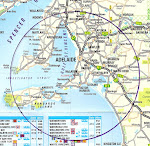Free range chicken from Willunga butcher
I looked around the kitchen for inspiration, and found the following -
Leftover Lemon Lime Chicken Stuffing
3 leftover egg whites,
Leftover cous cous (yes we still have some lurking in the pantry),
The dregs of preserved lime from 'Once a year' of Kanmantoo (Stirling Market),
Harding's fine foods almond paste - Willunga,
from the pantry -
Thistle Be Good - Dukkah Egyptian (a gift from Jacqui)
Home made bread crumbs
Lemon zest (from Kat's friend's tree)
Garlic (farmer's market)
Basil &Thyme from the garden
Mix it all together and stuff into chicken cavity, (add salt & pepper to taste)
I poured some rainwater over the chicken and rubbed some rock salt on the skin.
Into the oven in a tray to slow cook on 150C ( fan forced electric)
I think it was the best tasting stuffing I have ever made - Delicious
Water Mellon Seed Saving
Watermellon Seeds from my prize watermellon, they dried nicely on this plate, no mould problems
To combat my illness, I have been self medicating with green juice of spinach, cellery, and pear. It is surprisingly very tasty, and very GREEN!
And finally after about 2 1/2 weeks, we have SEA SALT!
And dust and a bug too!
Rusty Sea Salt
It was a mistake to put the sea water on my oven trays. The salt would have been high in iron, but not very palatable I think. I ditched this.
It tastes OK but is perhaps a little un-hygenic. Next time I will try it in the dehydrator. So it does work to create your own sea salt from sea water, it just takes a lot of patience, and dust and insect proofing. Also pay attention to the equipment used - metal that will rust, and aluminium is not a good idea, as the coating will contaminate the salt - thanks for the information from my friend Ray.












No comments:
Post a Comment